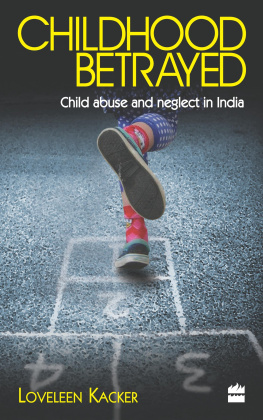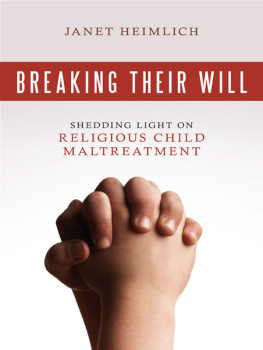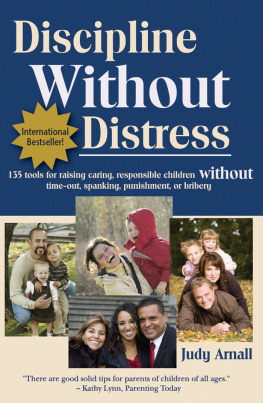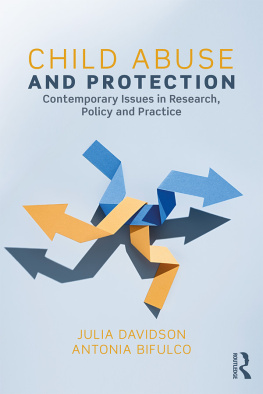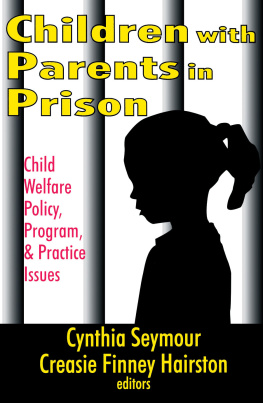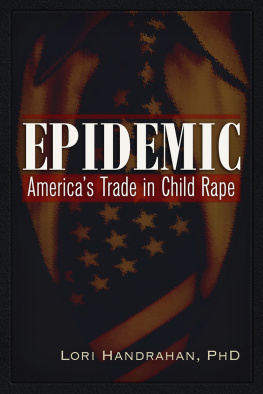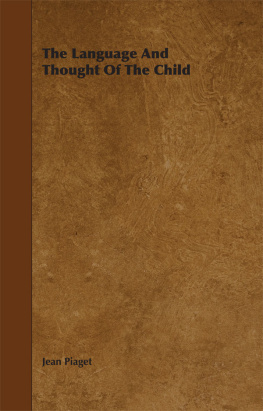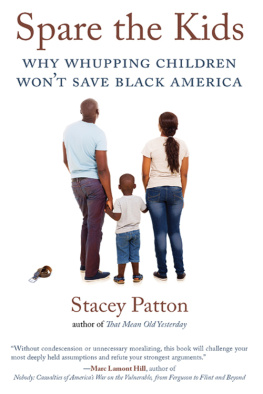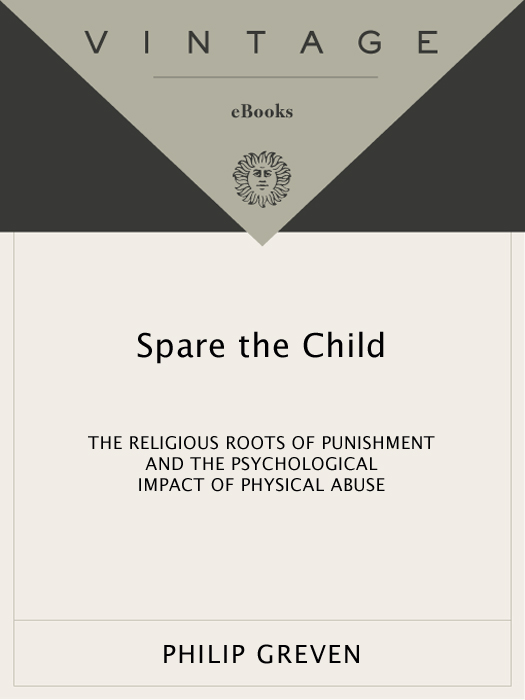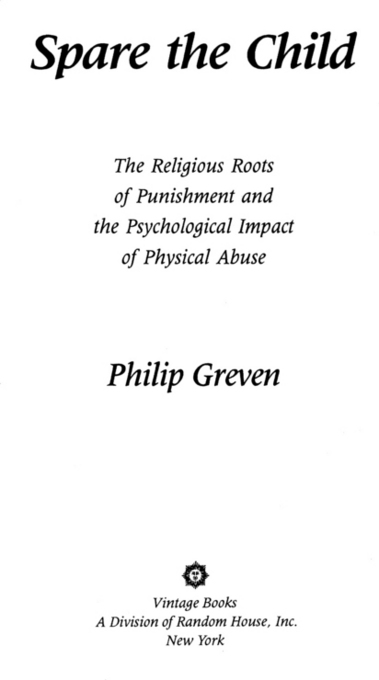Books by Philip J. Greven
The Protestant Temperament:
Patterns of Child-rearing, Religious Experience, and the
Self in Early America
Spare the Child:
The Religious Roots of Punishment and the Psychological
Impact of Physical Abuse
Four Generations:
Population, Land and Family in Colonial Andover,
Massachusetts
First Vintage Books Edition, March 1992
Copyright 1990 by Philip J. Greven, Jr.
All rights reserved under International and Pan-American Copyright Conventions. Published in the United States by Vintage Books, a division of Random House, Inc., New York, and simultaneously in Canada by Random House of Canada Limited, Toronto. Originally published in hardcover by Alfred A. Knopf, Inc., New York, in 1991.
Owing to limitations of space, all acknowledgments for permission to reprint previously published material can be found on .
Library of Congress Cataloging-in-Publication Data
Greven, Philip J.
Spare the child : the religious roots of punishment and the psychological impact of physical abuse / Philip Greven.
p. cm.
Originally published in hardcover by Alfred A. Knopf, Inc.,
New York, in 1991T.p. verso.
eISBN: 978-0-307-77300-5
1. Corporal punishmentUnited StatesHistory. 2. Corporal punishmentPsychological aspects. 3. Corporal punishment
Religious aspectsChristianityHistory of doctrines.
4. Discipline of childrenUnited StatesHistory. 5. Discipline of childrenPsychological aspects. 6. Discipline of children
Religious aspectsChristianityHistory of doctrines.
7. Child abuseUnited StatesHistory. 8. Child abuse
Psychological aspects. 9. Child abuseReligious aspects
ChristianityHistory of doctrines. I. Title.
[HQ770.4.G74 1992]
649.1dc20 91-50487
v3.1
FOR HAROLD
CONTENTS
ACKNOWLEDGMENTS
This book has been long in the making, almost an entire lifetime so far. I was raised in a family of Protestants, mostly Methodists, at least on my mothers side. My maternal grandmother, especially, was a quietly devout Christian for whom religion was far more than merely routine church-going. The Bible was the one book that she always read, and she saw to it that we attended Sunday school at the local Methodist church when we lived with or visited her. Being raised as a Protestant has had an enduring impact upon me both personally and as a scholar. The Protestant Temperament and this book grew out of my own religious roots as well as reflecting my adult fascination with the personal sources of religious thought and experience. In many ways, no doubt, Spare the Child is a sequel to my earlier book, bringing it up to the present in ways that I could not have anticipated many years ago, when I first began my quest for an understanding of these issues.
Equally important is the fact that, like so many other Americansincluding many of those whose stories will unfold in the pages of this bookI was physically punished as a child. One memory, representative of many, remains embedded ineradicably in my own mind. When I was about eight years old, we lived in Orlando, Florida, where my father was serving as an officer in the United States Air Force. One day I decided to see how deep a hole I could dig in the sand with a hose gushing full force. The water easily pushed the sand aside, digging a hole many feet deep. The hose disappeared into the ground, burying itself and giving me intense pleasure and satisfaction until I tried to pull it out. Frozen, immobile, absolutely impossible to pull up, the hose seemed to be locked in place forever. Instantly, I knew that I was in trouble; but, since the hose was stuck in the sand, I had no choice but to tell my mother what had happened. She said to wait until my father came home: He would deal with it and with me. I waited, seemingly forevertime can be an eternity to an eight-year-old expecting punishmentuntil my father returned. I was sent to my room to await my punishment. My father went outdoors, somehow freed the hose from the sands tight grasp, and came inside to spank me for my misadventure and, presumably, for the difficulties it had caused him.
Many years later, my father reminded me of that incident, acknowledging how angry he had been at the time and recollecting that he had given me one of the hardest spankings of my life. When a man who weighs over two hundred pounds, stands six feet, and has huge hands spanks a small boy hard, it surely must hurt. Yet to this day, I have no conscious memory of the actual pain that he inflicted and I felt. I only can remember the events that led up to the punishment itself. Amnesia has suppressed the pain I must have experienced that afternoon or early evening. The event itself, however, remains vividly imprinted on our familys collective memory. There are certain spankings that one never forgets.
There are also certain stories from childhood that one never forgets. I have often thought about three stories that were read to me again and again when I was small, stories that still resonate to my innermost concerns: Munro Leafs The Story of Ferdinand the bull, Chicken Little, and Watty Pipers The Little Engine That Could. Ferdinand occasionally embarrassed me as an adult when I thought about my own boyhood. Ferdinand, after all, refused to fight in the bullring like the other bulls of his day and time in Spain, and he was sent back to the field in utter disgust by the men who had not had the pleasure of killing him. There he remained for the rest of his life, sitting under the cork tree, smelling the flowers, and being happy. Ferdinand, I now realize, was actually a survivor, a rare bull who refused to fight, who was sensitive to beauty and to the wonderful scent of the flowers in the fields and in the hair of the women at the bullring. Ferdinand was not willing to die for the principle of violence and destruction inherent in the bullring. Chicken Little, on the other hand, was utterly certain that the sky was falling on her head (when, in fact, it had only been a stone falling from the roof of her coop). While she went about warning her friends of the imminent catastrophe, she overlooked the more pressing danger posed by Foxy Loxy. Even at five, I must have sensed some connection between her anxiety and mine since I, too, often felt that the sky might fall at any moment. Chicken Little always has been for me the epitome of an apocalyptic. The Little Engine, on the other hand, set forth the Protestant work ethic for children of the Depression in the 1930s. The small runty engine managed to outdo the bigger, handsomer, and stronger engines that either passed by disdainfully or gave up the task of pulling the train filled with Christmas toys over the mountain. Stories such as these helped me make sense of my life and myself as a boy. They helped me cope with the anxieties and the fears generated by punishments as well as rationalize my own boyhood proclivity toward nonviolence and the life of the mind.
I feel that it is important for readers of this book to know that I write about physical punishment from the perspective of one to whom it was doneby well-intentioned and loving parents, to be sureand also of one who, as a parent, has done it on at least a few occasions. I doubt that I would have spent so many years exploring and trying to understand the arguments about corporal punishments and the implications of such punishments for myself and for others if I, too, had not experienced them. I believe that scholarship should be brought to bear upon problems that engage our innermost beings. My own scholarship always has been. This book reflects my wish to be a part of the process of changing the ways people rear children. Without the impulse both to change myself and to change others, this study would neither have taken shape nor been completed.


